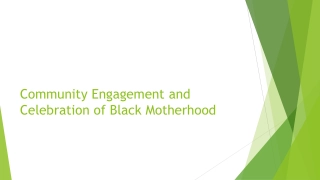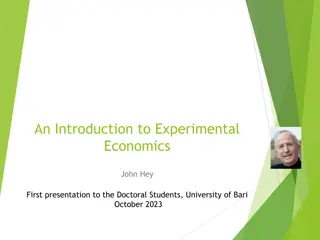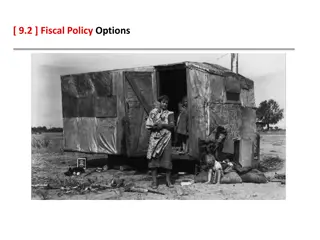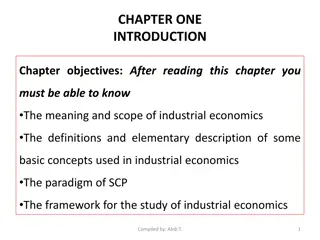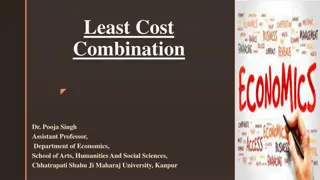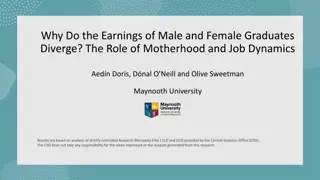
Revolutionizing Family Economics for Working Mothers
Explore the intersection of economics and motherhood, advocating for family-friendly policies to support working mothers. Discover the economic challenges faced by mothers and their children, along with proposed solutions such as flexible working hours, parental involvement, and paid maternity leave. Gain insights into the impact of parenthood on gender-based differences in employment and earnings. Dr. Michelle Budig sheds light on the evolving dynamics of family economics in the modern world.
Download Presentation

Please find below an Image/Link to download the presentation.
The content on the website is provided AS IS for your information and personal use only. It may not be sold, licensed, or shared on other websites without obtaining consent from the author. If you encounter any issues during the download, it is possible that the publisher has removed the file from their server.
You are allowed to download the files provided on this website for personal or commercial use, subject to the condition that they are used lawfully. All files are the property of their respective owners.
The content on the website is provided AS IS for your information and personal use only. It may not be sold, licensed, or shared on other websites without obtaining consent from the author.
E N D
Presentation Transcript
+ Economics of motherhood What do family friendly economics look like?
+Begin with supportive family planning, pregnancy, and birthing policies and processes Create educational opportunities for conscious decision making processes available to prospective parents, BEFORE pregnancy Understand the healthy necessity of prolonged, early bonding experiences between parents and infants Provide spouses or significant others in a woman s life with opportunities to share parenting responsibilities Create safe birthing environments that encourage minimally invasive procedures
+Some economic facts about mothers and their children More than 10% of CA women live in poverty ($14,824 for mom and two children) (PPIC, 2003) In CA, full-time child care = 20% of a mother s earnings (PPIC, 2003) Child care in CA for a two to five year old was $6,739 per year on average (PPIC, 2003) 91%+ of U.S. moms working outside home have experienced depression (Working Mother, 2008)
+Working mothers ? 82% of U.S. moms work outside the home. A redundancy? What workplace provisions might benefit the evolution and support of healthy families and productive workers? Flexible hours Onsite childcare Family leave Parental involvement Creative reconfiguration of social environment
+Bloomberg Report (February 2011) USA in comparison with developed nations America last among industrialized peers with no paid federal maternity leave EU is considering increasing minimum paid maternity leave from 16 weeks to 18 USA ranks 26thamong the 34 identified industrial nations in the employment of women with higher education USA has the highest poverty rate for female single-headed households among the 22 wealthy countries studied: 30.9% compared to a group average of 10.5%
+Dr. Michelle Budig Professor of Sociology, University Massachusetts, Amherst A significant portion of gender based differences in employment, Earnings, and experiences of discrimination are increasingly related to parenthood. (February 2011)
+Joan Williams, Director Center for WorkLife Law, Hastings Law School The United States is really out of the loop when it comes to maternity leave. Not having a paid leave mandate means a squandering of human capital that is something that we can ill afford in today s rapidly globalizing world. (February, 2011)
+UN Fourth World Conference on Women Platform for Action 1995 The eradication of female poverty cannot be accomplished through anti- poverty programs alone, but will require democratic participation and changes in economic structures in order to ensure access for all women to resources, opportunities, and public services.
+Parenting isnt for sissies, especially for moms Successful parenting requires social organization derived from a wide range of family and friends: mom, spouse/significant other, as well as other family members and the circle of friends Raising the future generation requires social interventions from everyone A healthy society comprised of contributing, productive members is directly derived from the success of its families What have you done today to support a mother? A family?
+A list of a few books and articles regarding motherhood and the relationship of families to social health in the United States. Arlie Russell Hochschild, The Second Shift: Working Parents and the Revolution at Home Barbara Williams, Mothering the Mind and Soul: African American Mothers' Beliefs and Practices to Ensure Academic and Social Success for Their Daughters in High School Elaine Zimmerman, But I m Just a Parent: Parent Leadership is About Democracy Ellen Lewin, Lesbian Mothers: Accounts of Gender in American Culture Hui-Ying Tsai, Work-Family Conflict, Positive Spillover, and Emotions among Asian American Working Mothers Lynet Uttal, Making Care Work: Employed Mothers in a New Childcare Market Mary Romero, Maid in the USA: Women Domestic Workers, the Service Economy and Labor Valerie Ooka Pang, Asian Pacific American Cultural Capital: Understanding Diverse Parents and Students

